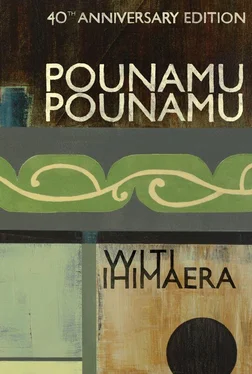‘Your Nani Miro told me to give this to you when you were ready. Are you ready, Tama? When you are, come home and, this time, stay.’
I went to see Nani Tama again before I left to come back to Wellington.
But one night, the telephone rang for me.
It was Dad and he had bad news. The old homestead, Nani Tama’s place, had burned down to the ground that night. Some people had been staying with Nani, and one of them had gone to sleep smoking a cigarette. The blankets had caught fire and the fire had spread quickly through the house. Luckily Nani Tama and the people had been able to get out. But Nani Tama, so Dad said, had gone crazy, looking at the flames and crying:
‘Miro! Miro!’
Everybody in the village had rushed to the homestead, bringing buckets, tins and basins full of water. The old people, the young children, all helped, but it was no good. The homestead was old and the flames were hungry upon it. By the time the fire brigade arrived, it was too late. Afterwards a Pakeha had tried to comfort Nani Tama by saying, Never mind. He hadn’t understood when Nani had said to him: ‘All my family, all this whanau, were in that house. All. And Miro.’
I wept when Dad told me. The homestead wasn’t just four walls and rooms. It was the manawa, the heart of the whanau, the heart of the family, and my Nani Tama’s heart too. For a long time afterward, I could think only of the flames leaping through the sitting room, licking at the photographs, a sports shield burning, a feather cloak afire, around a table where women used to sit, across an old piano, into a drawer where the whakapapa sheets were kept. But then I remembered the greenstone and Nani Tama’s words about carrying on Nani Miro’s work. There are some things fire can never destroy. And I saw not fingers of flame but a soft luminous glow reaching out and around me.
FIRE ON GREENSTONE
‘Fire on Greenstone’ is a kind of sequel to ‘A Game of Cards’ and is about handsome Nani George Tupara, although in the story he is called Nani Tama. It’s the King of Clubs story to go with Nani Mini’s Queen of Hearts story. I wasn’t much of a card player in those days, nor am I now, but I think that in some card games you have to have what’s known as an ‘off suit’, and if it’s not in a red card it’s in a black.
The story is set about two years after the fictional Nani Miro has died, but its setting is really Nani Mini’s blue house in Waituhi. As I’ve already said, I loved going to see her whenever I was in Waituhi, and that didn’t stop until the day she died. Apart from anything else, The Blue House was where all the feather cloaks, piupiu, trophies and shields were stored. In the story, however, I ‘shifted’ her house next to the meeting house so that I could make it into something imagined and metaphorical. It is this, imagined, house which burns down. At the time I was writing the story, the burning down of ‘Miro’s Museum’ was supposed to be symbolic of what I saw was happening to rural Maori culture and tribal continuity. Sometimes I can get too clever: the New Zealand Fire Service asked if they could use the story in a fire prevention campaign directed at Maori.
Throughout 1970 I kept writing my one story a month. I was being supported by a number of people, including Gill Shadbolt (I was working in Post Office public relations in Wellington) and also my dear, wonderful friend Joy Stevenson, editor of Te Ao Hou , a magazine of Maori writing, who saw that there was a new kid on the block joining other Maori fiction writers such as Arapera Blank, Riki Erihi, Mason Durie, Katarina Mataira, Patricia Grace and Rowley Habib. I used to sneak into the Wellington Public Library from time to time to look at Jacquie Sturm, but I was too shy to approach her.
Among other supporters was a gentleman by the name of Arthur Jones, then a script editor for the New Zealand Broadcasting Corporation. My good friend Fiona Kidman introduced me to him. I credit Arthur with the directness in my writing: in those days you didn’t get much mucking around in my stories. This is because Arthur wanted stories that only took ten minutes maximum to read, so I had to learn how to set up a story fast, get listeners to laugh — or cry — fast, and then get out of the story fast. ‘A Game of Cards’, ‘Beginning of the Tournament’, ‘Fire on Greenstone’ and ‘In Search of the Emerald City’ were all originally written for radio. I wrote two series of stories, twelve in all, and they were read by George Henare, actor, cuzzie bro and fellow East Coastie.
And Fiona and I, ever since, have been hitched to the same star.
The Other Side of the Fence
It is Sunday and the Simmons family have just arrived home from a picnic. They are all pleasantly tired. It has been a beautiful day.
Every Sunday, straight after morning church service, it is a ritual of the Simmons’ to drive into the country with a hamper of sandwiches and a picnic spread. They often used to go on picnics in England and they see no reason to discontinue the custom now that they live in New Zealand. For three years now, the street has become accustomed to the sight of the Simmons’ old car gaily trundling away from the city. Most of the neighbours are indifferent to this weekly occurrence. But in the house next door to the Simmons house, six little black heads are to be seen peering sadly after the departing car. For the Heremaia children, Sunday is a sad day because the Simmonses have gone away. All day they will be seen roaming around in lost circles, making desultory efforts to play games with one another and usually ending up picking on one another. Around the end of the afternoon, they will be seen sitting on the fence which separates their property from the Simmons house, like six little blackbirds parched by the summer. Waiting, just waiting. Waiting for the Simmonses to return home. They like the Simmonses.
But today, there are no blackbirds perched on the fence. Their house is silent and the backyard is empty. No curious cries greet the Simmons car as it turns into the driveway and stops:
‘Did you fellas have a good time?’
‘Have you got any sandwiches left over for us, Mrs Simmons?’
‘Boy! Wish we could’ve come with you fellas.’
This time there is silence.
Sally Simmons gets out of the car. The two Simmons children, Mark and Anne, scramble after her.
‘Mark, take the picnic basket indoors,’ Sally instructs. ‘Anne, bring in the rug. And Jack, don’t take too long locking the car away. I’ll make us all a nice cup of tea.’
Jack Simmons nods. He watches as his wife shepherds the children into the house. Then he drives the car into the garage. Carefully, he locks all the doors of the car. Then he pauses, chuckles to himself, and glances quickly toward the house next door.
And at a bedroom window, he sees little Jimmy Heremaia staring back at him.
Jack Simmons’ smile grows broader. He locks the garage door as well. Better to be safe than sorry. There’s no telling what those Heremaia kids might get up to next.
Satisfied now, Jack Simmons walks up the path toward his house. He takes off his shoes.
‘Sally, have I time for a shower before dinner?’
‘Yes, but come and have a cuppa first, dear.’
He goes into the kitchen. Mark and Anne are milling around the biscuit jar. Sally shoos them away. The table is set with two glasses of milk for the children and Sally is preparing a cup of tea for herself and her husband.
‘It won’t be long. Mark! Anne! To the table, please.’
The children seat themselves. After a while, Mark says:
‘I wonder where they are?’
‘Who?’ Jack Simmons asks.
‘George, Henare, Annie …’
‘Probably having their dinner,’ Sally Simmons answers.
Читать дальше












